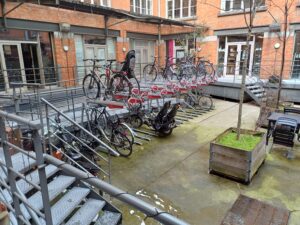The Dansaert Center encourages its users to use alternative means of transport to individual cars for commuting and professional travel.
Why?
Motorized transport has various consequences on health, climate, environmental quality, and other economic and societal aspects.
- Air pollution : vehicles are the main contributors to air pollution in Brussels.
- Noise pollution : nearly one in four residential buildings in Brussels is exposed to uncomfortable noise levels due to intense road traffic.
- Health impact : traffic generates air pollution that leads to stress, respiratory and cardiovascular diseases, road accidents, and premature deaths.
- CO2 : fuel consumption represents a significant part of energy consumption in Brussels, and the current increase in fossil fuel costs may further strain household budgets.
- Urban space occupation and landscape degradation : cars occupy more public space in the city, reducing space for pedestrians and cyclists.
- Indirect vehicle pollution : in Belgium, the volume of collected end-of-life vehicles in 2022 amounts to 86,333 tonnes, including used tires and reusable parts (source: 2022 annual report from Febelauto).
Why use bicycles?
- Health benefits: 30 minutes of cycling or walking per day can reduce the risk of cardiovascular problems, diabetes, cancer, stress, etc., by 30%.
- Safety: Cyclists are 10 times less likely to be injured than car occupants. Government initiatives aim to create secure spaces for cyclists and combat bike thefts.
- Less pollution.
- Time-saving: For a 3-kilometer journey, cycling is faster than driving, including parking. Cycling is the most efficient mode of transport for distances under 5km.
- Cost-effective: For a 10 km/day journey, cycling costs €100/year compared to €1,000/year
 for a car. Space efficiency: One car parking space equals 10 bicycle spaces.
for a car. Space efficiency: One car parking space equals 10 bicycle spaces.
Facilities at the Center?
The parking spaces help maintain a strong cycling community among users.
An objective in 2024 is to highlight these users in the Center’s carbon footprint. Cyclists appeared underrepresented in the last mobility survey.
internal source
What about my business logistics?
Several companies offer sustainable transport services suitable for the city.
- Dioxyde de Gambettes has been providing cargo bike deliveries since 2008 for supply, internal logistics, and distribution to businesses, public institutions, and individuals.
- Urbike is a cooperative offering four services (sales, advice, training, services) to improve urban quality of life.
- Molenbike is a shared platform offering local and fair bicycle logistics solutions.
- and some others..








